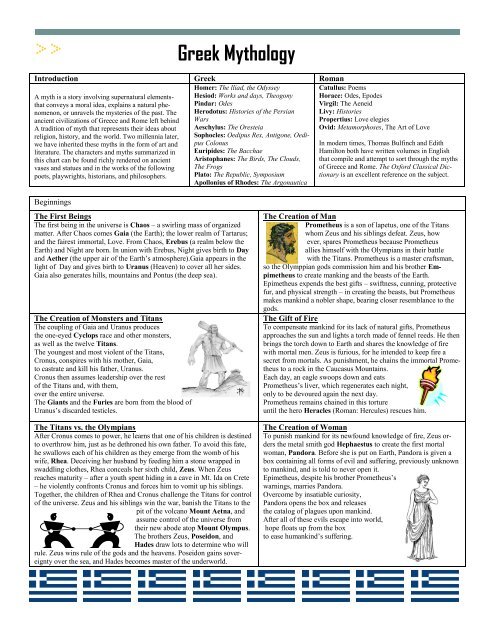Greek Mythology Handout - Landmark Christian School
Greek Mythology Handout - Landmark Christian School
Greek Mythology Handout - Landmark Christian School
Create successful ePaper yourself
Turn your PDF publications into a flip-book with our unique Google optimized e-Paper software.
<strong>Greek</strong> <strong>Mythology</strong><br />
Introduction <strong>Greek</strong> Roman<br />
Homer: The lliad, the Odyssey<br />
A myth is a story involving supernatural elements- Hesiod: Works and days, Theogony<br />
that conveys a moral idea, explains a natural phenomenon,<br />
or unravels the mysteries of the past. The Herodotus: Histories of the Persian<br />
Pindar: Odes<br />
ancient civilizations of Greece and Rome left behind Wars<br />
A tradition of myth that represents their ideas about Aeschylus: The Oresteia<br />
religion, history, and the world. Two millennia later, Sophocles: Oedipus Rex, Antigone, Oedipus<br />
Colonus<br />
we have inherited these myths in the form of art and<br />
literature. The characters and myths summarized in Euripides: The Bacchae<br />
this chart can be found richly rendered on ancient Aristophanes: The Birds, The Clouds,<br />
vases and statues and in the works of the following The Frogs<br />
poets, playwrights, historians, and philosophers. Plato: The Republic, Symposium<br />
Apollonius of Rhodes: The Argonautica<br />
Catullus: Poems<br />
Horace: Odes, Epodes<br />
Virgil: The Aeneid<br />
Livy: Histories<br />
Propertius: Love elegies<br />
Ovid: Metamorphoses, The Art of Love<br />
In modern times, Thomas Bulfinch and Edith<br />
Hamilton both have written volumes in English<br />
that compile and attempt to sort through the myths<br />
of Greece and Rome. The Oxford Classical Dictionary<br />
is an excellent reference on the subject.<br />
Beginnings<br />
The First Beings<br />
The first being in the universe is Chaos a swirling mass of organized<br />
matter. After Chaos comes Gaia (the Earth);; the lower realm of Tartarus;;<br />
and the fairest immortal, Love. From Chaos, Erebus (a realm below the<br />
Earth) and Night are born. In union with Erebus, Night gives birth to Day<br />
and Aether <br />
light of Day and gives birth to Uranus (Heaven) to cover all her sides.<br />
Gaia also generates hills, mountains and Pontus (the deep sea).<br />
The Creation of Monsters and Titans<br />
The coupling of Gaia and Uranus produces<br />
the one-eyed Cyclops race and other monsters,<br />
as well as the twelve Titans.<br />
The youngest and most violent of the Titans,<br />
Cronus, conspires with his mother, Gaia,<br />
to castrate and kill his father, Uranus.<br />
Cronus then assumes leadership over the rest<br />
of the Titans and, with them,<br />
over the entire universe.<br />
The Giants and the Furies are born from the blood of<br />
<br />
The Titans vs. the Olympians<br />
After Cronus comes to power, he learns that one of his children is destined<br />
to overthrow him, just as he dethroned his own father. To avoid this fate,<br />
he swallows each of his children as they emerge from the womb of his<br />
wife, Rhea. Deceiving her husband by feeding him a stone wrapped in<br />
swaddling clothes, Rhea conceals her sixth child, Zeus. When Zeus<br />
reaches maturity after a youth spent hiding in a cave in Mt. Ida on Crete<br />
he violently confronts Cronus and forces him to vomit up his siblings.<br />
Together, the children of Rhea and Cronus challenge the Titans for control<br />
of the universe. Zeus and his siblings win the war, banish the Titans to the<br />
pit of the volcano Mount Aetna, and<br />
assume control of the universe from<br />
their new abode atop Mount Olympus.<br />
The brothers Zeus, Poseidon, and<br />
Hades draw lots to determine who will<br />
rule. Zeus wins rule of the gods and the heavens. Poseidon gains sovereignty<br />
over the sea, and Hades becomes master of the underworld.<br />
The Creation of Man<br />
Prometheus is a son of lapetus, one of the Titans<br />
whom Zeus and his siblings defeat. Zeus, how<br />
ever, spares Prometheus because Prometheus<br />
allies himself with the Olympians in their battle<br />
with the Titans. Prometheus is a master craftsman,<br />
so the Olymppian gods commission him and his brother Empimetheus<br />
to create manking and the beasts of the Earth.<br />
Epimetheus expends the best gifts swiftness, cunning, protective<br />
fur, and physical strength in creating the beasts, but Prometheus<br />
makes mankind a nobler shape, bearing closer resemblance to the<br />
gods.<br />
The Gift of Fire<br />
To compensate mankind for its lack of natural gifts, Prometheus<br />
approaches the sun and lights a torch made of fennel reeds. He then<br />
brings the torch down to Earth and shares the knowledge of fire<br />
with mortal men. Zeus is furious, for he intended to keep fire a<br />
secret from mortals. As punishment, he chains the immortal Prometheus<br />
to a rock in the Caucasus Mountains.<br />
Each day, an eagle swoops down and eats<br />
<br />
only to be devoured again the next day.<br />
Prometheus remains chained in this torture<br />
until the hero Heracles (Roman: Hercules) rescues him.<br />
The Creation of Woman<br />
To punish mankind for its newfound knowledge of fire, Zeus orders<br />
the metal smith god Hephaestus to create the first mortal<br />
woman, Pandora. Before she is put on Earth, Pandora is given a<br />
box containing all forms of evil and suffering, previously unknown<br />
to mankind, and is told to never open it.<br />
<br />
warnings, marries Pandora.<br />
Overcome by insatiable curiosity,<br />
Pandora opens the box and releases<br />
the catalog of plagues upon mankind.<br />
After all of these evils escape into world,<br />
hope floats up from the box
<strong>Greek</strong> <strong>Mythology</strong><br />
The Pantheon of <strong>Greek</strong> Gods and Goddesses<br />
<strong>Greek</strong> Name Roman Name Divine Realm<br />
Aphrodite Venus Love, beauty, fertility<br />
Apollo Apollo Archery, music, prophecy, healing, light<br />
Ares Mars War<br />
Artemis Diana Hunting, the moon<br />
Athena Minerva Wisdom, war<br />
Demeter Ceres The harvest, grain, corn<br />
Dionysus Bacchus Wine, festivity, the theater<br />
Eros Cupid Love, sexual desire<br />
Hades Pluto The underworld, the dead<br />
Hephaestus Vulcan Fire, the forge, smithery<br />
Hera Juno Marriage, queen of immortals<br />
Hermes Mercury Messenger, commerce, science, doctors<br />
Hestia Vesta The hearth<br />
Pan Pan Wild beasts, the forest<br />
Persephone Proserpine Queen of the underworld<br />
Poseidon Neptune The sea<br />
Zeus Jupiter Thunder, the heavens, king of immortals<br />
Page 2<br />
You need to know the <strong>Greek</strong> gods/<br />
goddesses by both of their <strong>Greek</strong> and<br />
Roman names. You also need to<br />
know what they are god/goddess of.<br />
These characters are referred to<br />
many time in classical literature.<br />
Many of the things that we will read<br />
this year will make a reference to a<br />
<strong>Greek</strong> god/goddess and you will need<br />
to know that reference to understand<br />
the work. These will also show up on<br />
the AP exam. Know this chart well!<br />
Aphrodite<br />
Aphrodite emerges fully formed from the sea foam<br />
off the coast of the island of Cyprus. The goddess<br />
of beauty, love and fertility, she is forced to wed<br />
the least sexually attractive of the gods, the divine<br />
metal smith, Hephaestus. Unsatisfied with her lame<br />
husband, Aphrodite makes many lovers, most notably<br />
Ares, the god of war. Her children include<br />
Eros, the boy god who incites romantic desire with<br />
his arrows, and Trojan hero Aeneas, whose birth<br />
results from an affair between Aphrodite and the<br />
Trojan shepherd Anchises. The goddess seduces<br />
Anchises bragging to his friends about his exploits<br />
with the goddess, he is struck by lightning,<br />
blinded, and lamed. Nonetheless, their son, Aeneas,<br />
remains dear to Aphrodite, and she aids the Trojans in the Trojan<br />
War and in their exodus to Italy after the sack of Troy.<br />
Apollo<br />
Zeus sires Apollo on the island of Delos.<br />
Leto, suffers an<br />
agonizing nine-day labor to deliver him and his<br />
twin, the divine virgin huntress Artemis. Apollos<br />
is the patron of herdsmen and the god of<br />
archery, music, healing and light. Prophecy of<br />
the future also falls under his realm, and he<br />
inspires the prophetess who serves as the Oracle<br />
at Delphi. During the Trojan War, Apollo<br />
favors Troy and personally guides the arrow of<br />
the Trojan warrior Paris so that it cuts down the<br />
mighty <strong>Greek</strong> hero Achilles. To the ancient <strong>Greek</strong>s, Apollo embodied<br />
the ideal of youth and masculinity, and stories of his love affairs with<br />
mortal women abound. The women in these stories who spurn his advances<br />
inevitably pay the price. While wooing Cassandra, a daughter of<br />
the Trojan King Priam, Apollo bestows on her the gift of prophecy, but<br />
when she rejects him, he curses her to make prophecies that are always<br />
correct but never believed. While courting the Cumaean Sibyl, Apollo<br />
offers to grant her any wish, and she asks to live as many years as she<br />
can hold grains of sand. The god allows the Sibyl her wish, but after<br />
she refuses him, he denies her the gift of eternal youth. She withers<br />
with each passing year, and before long, comes to wish in vain for her<br />
own death.<br />
Ares<br />
The god of war and a son of Zeus and<br />
Hera, Ares incites violence and behaves<br />
brutishly, drawing the ire and disdain of<br />
the other gods, including his parents. Ares<br />
never marches with a particular army into<br />
battle but merely inspires various combatants<br />
to fight each other with savage aggression.<br />
In the Trojan War, he assists the Trojans.<br />
Ares fathers warriors by many mortal<br />
lovers and pursues a long love affair with<br />
Aphrodite. By the vestal virgin Rhea Silva of Alba Longa he sires the<br />
twins Romulus and Remus, who are expelled from their home and<br />
raised by a she-wolf. In their maturity, they found Rome, and the Romans<br />
attribute their success in martial affairs<br />
<br />
Artemis<br />
Daughter of Zeus and the Titaness Leto,<br />
Artemis is the twin sister of Apollo and a<br />
patroness of women, especially athletic,<br />
warlike women such as Atalanta and the<br />
Amazons. Artemis rules over the forest and<br />
the hunt and aggressively protects her virtue<br />
and virginity. Suffering an insult, she murders<br />
the handsome, gigantic hunter Orion,<br />
who assumes a place among the constellations<br />
in the night sky.
<strong>Greek</strong> <strong>Mythology</strong><br />
Athena<br />
<br />
ax to relieve him of a headache, motherless<br />
Athena springs forth, fully armed for battle and<br />
uttering a war cry, from the skull of her father.<br />
The goddess of wisdom and craftsmanship,<br />
Athena sometimes assumes the form of an owl.<br />
She often leads armies into battle and assists<br />
warriors in combat, as she does Odysseus and<br />
Achilles in the Trojan War. The city of Athens<br />
<br />
in a contest with Poseidon for stewardship of<br />
the city. Zeus declares that the one who presents<br />
the city with the more useful gift will win its<br />
devotion. Poseidon causes a spring to well up,<br />
but it yields only salt water;; Athena counters<br />
with an olive tree, which provides food, oil, and<br />
wood.<br />
Demeter<br />
A sister of Zeus and daughter of<br />
the Titans Cronus and Rhea, Demeter<br />
reigns over agriculture, especially<br />
grain and corn. Hades<br />
Persephone<br />
(Roman: Proserpine), to<br />
the underworld to be his bride.<br />
Mourning the loss of her child,<br />
Demeter flees Olympus and wanders<br />
the Earth in the guise of a<br />
mortal woman, allowing the fields<br />
to fall into drought and causing the<br />
<br />
ine. To appease Demeter and return<br />
fertility to the fields, Zeus<br />
plucks Persephone from Hades and returns her to her mother. However,<br />
because Persephone ate the food of the underworld though just a few<br />
pomegranate seeds she is bound to dwell in Hades several months of<br />
<br />
<br />
Dionysus<br />
When the mortal princess Semele of Thebes<br />
arouses the amorous attentions of Zeus, Hera,<br />
<br />
approaches Semele in disguise and tells her to<br />
ask her immortal lover to appear before her in<br />
his true, undisguised form. Zeus obeys the<br />
request and appears to Semele as a frenzy of<br />
lightning bolts, which fatally scorch her and<br />
endanger a divine seed in the process. Zeus<br />
preserves the fetus by implanting it in his<br />
thigh, where it gestates and eventually<br />
emerges as the god Dionysus. The newborn<br />
god of wine and festivity seeks his mother in<br />
the underworld and delivers her to Olympus,<br />
where she is rendered immortal. To the ancient<br />
<strong>Greek</strong>s, Dionysus was the object of intense<br />
religious devotion, especially among a cult of women called the Maenads.<br />
Their celebrations of Dionysus involved excessive drinking of<br />
alcohol, the whirling of torches or thyrsi (staffs wrapped in vines or<br />
leaves), and sometimes the dismemberment of animals or even human<br />
children.<br />
Page 3<br />
Eros<br />
Armed with a bow and a quiver of arrows,<br />
the boyish, winged son of Aphrodite inspires<br />
erotic desire in the hearts of his victims, his<br />
love darts causing knees to tremble with<br />
longing. When the mortal princes Psyche<br />
gains so much renown for her beauty that she<br />
<br />
dispatches her son to strike Psyche with desire<br />
for the basest of mortal men. By accident,<br />
Eros wounds himself with his own arrow<br />
when he comes upon Psyche sleeping.<br />
Stricken with desire for the princess, Eros<br />
visits her only by night and never allows her<br />
to see his face. One night, she lights a lamp<br />
and catches a glimpse of his face, so he<br />
ceases his visits. Aphrodite, still jealous of<br />
the princess, forces Psyche to perform several difficult tasks to win<br />
Eros back. One of these tasks requires her to descend to the underworld<br />
and fetch a box of beauty from Persephone. Foolishly, Psyche<br />
opens the box before she brings it to Aphrodite and within she finds<br />
intoxicating sleep. Eros plunges to the underworld to rescue his beloved,<br />
wakes her, and pleads his case to Zeus. Ultimately, Zeus convinces<br />
Aphrodite to forgive Psyche and then welcomes the princess to<br />
Olympus as an immortal.<br />
Hephaestus<br />
To the dismay of his parents, Zeus<br />
and Hera, Hephaestus is born weak<br />
and physically lame. He redeems<br />
himself through his work as the god<br />
of fire and smithery. With the help<br />
of his apprentices, the Cyclopes, at<br />
his workshop below the volcano<br />
Mount Aetna, Hephaestus forges<br />
the armor of Achilles, the scepter of<br />
Agamemnon, and the armor of Aeneas.<br />
Although Hephaestus never<br />
takes sides in the conflicts of mortal,<br />
the weapons and armor he shapes<br />
have the power to turn the tide of<br />
battle. Hephaestus is married to<br />
Aphrodite, who is frequently unfaithful<br />
to him with Ares and others.<br />
Hades<br />
The <strong>Greek</strong>s and Romans believed that<br />
souls descended below the Earth after<br />
the death of the body. Hades, a brother<br />
of Zeus and Poseidon, is the ruler of the<br />
underworld <br />
<br />
reputed to possesses enormous wealth.<br />
His realm is divided into regions corresponding<br />
to the character of the souls<br />
that dwell within them, including Elysium,<br />
the delightful plain of the blessed,<br />
and Tartarus, the gloomy terrain where<br />
the wicked are punished. When the dead<br />
arrive, they cross the river of Styx under<br />
the guidance of the ferryman Charon.<br />
On the other side, they are greeting by<br />
Cerberusheaded<br />
watchdog.
Hera<br />
Hera, the queen of the Olympian gods and<br />
the goddess of women and marriage, is a<br />
daughter of Cronus and Rhea and becomes<br />
<br />
Titan father. Hera is famous for her jeal-<br />
<br />
ire at the children spawned in his affairs,<br />
especially Heracles. The Trojan prince<br />
<br />
<br />
grudge against Troy drives her to favor the<br />
<strong>Greek</strong> side in the war and, after the war, to<br />
place innumerable obstacles in the way of<br />
the Trojan hero Aeneas on this quest to find<br />
Rome.<br />
Hermes<br />
The mischievous Hermes displays<br />
the talent and cunning<br />
from the day he is born. Soon<br />
after he springs from the womb<br />
of Maia, who bears him to her<br />
lover, Zeus, Hermes finds a turtle<br />
on the threshold of his cave,<br />
chops off its limbs, follows out<br />
its shell, and stretches strings<br />
across the shell to create the<br />
lyre, a musical<br />
instrument and ancestor to the<br />
modern guitar. Later, Hermes<br />
steals the sacred cattle of his<br />
brother Apollo, burns them in<br />
ritual sacrifice, and then sneaks back to his cradle and wraps himself<br />
in swaddling clothes. Maia, and then Apollo himself, confront Hermes,<br />
but he dies his crime. The two gods bring the matter before Zeus,<br />
<br />
ens the mood by playing a song on his lyre, which enchants Apollo.<br />
Offering his brother the lyre as a form of reconciliation, Hermes enters<br />
<br />
<br />
sandals and carrying a staff entwined by two snakes (called the<br />
kerykeoin in <strong>Greek</strong>, the caducues in Latin).<br />
Hestia<br />
A daughter of Cronus and Rhea,<br />
Hestia is the goddess of the<br />
hearth, the fireplace at the center<br />
of every ancient household.<br />
She refuses offers of marriage<br />
from both Poseidon and Apollo,<br />
choosing instead to remain a<br />
virgin and to tend the hearth of<br />
Olympus. Hestia is the most<br />
minor of the Olympians in ancient<br />
mythology, but she held an<br />
important place in the religious<br />
practices of ancient Greece and<br />
Rome. Every family honored<br />
her at the birth of a child, and<br />
every meal began and ended<br />
with a service to her.<br />
Pan<br />
Pan is the chief of the lesser gods of nature. With<br />
the torso and head of a man and the legs, horns,<br />
and ears of a goat, he dwells in the woods, mountains<br />
and caves. Pan, a son of Hermes, is famous<br />
for his love affairs with nymphs. He grants fertility<br />
to flocks, avenges cruelties perpetrated against<br />
animals, and has the power to incite panic in men<br />
and beasts. The <strong>Greek</strong>s held noon to be a sacred<br />
hour because they believed that Pan slept at that<br />
hour and would become angry if he were roused.<br />
Poseidon<br />
When the brothers Zeus, Poseidon, and Hades draw lots for dominion<br />
over the sky, the sea, and the underworld, Poseidon becomes ruler of the<br />
<br />
<br />
sons are brutal men and monsters like the Cyclops Polyphemus, as well<br />
as horses and bulls. Poseidon earns a reputation as the most vengeful of<br />
the gods for his torment of Odysseus <br />
wandering from Troy home to<br />
Ithaca. With the Gorgon Medusa,<br />
Poseidon sires the winged steed<br />
Pegasus<br />
hero Bellerophon tames the flying<br />
horse and flights on its back victoriously<br />
against the Amazons, a<br />
race of warrior women, and the<br />
Chiemera, a fire-breathing mon-<br />
<br />
<br />
lerophon tries to fly Pegasus to the<br />
heavens, the horse throws him to<br />
his death a common fate for<br />
mortals who display hubris, the<br />
<strong>Greek</strong> term for excessive pride or<br />
arrogance towards fate or the gods.<br />
Zeus<br />
Zeus rules over the heavens and all the<br />
<br />
<br />
mother, Rhea sprites him away to a<br />
cave on Crete to save him from his<br />
father, Cronus, who fearing that his<br />
children will overthrow him, swallows<br />
each other them as he or she is born.<br />
Rhea tricks Cronus by feeding him a<br />
stone wrapped in swaddling clothes in<br />
place of the baby Zeus. When Zeus<br />
grows up, he return from Crete rescues<br />
<br />
and defeats Cornus to take control of<br />
the universe. Armed with thunderbolts<br />
crafted for him by his son Hephaestus<br />
and his Cyclops servants, Zeus exerts<br />
supreme control over the heaves and<br />
the Earth. Although Zeus often allows<br />
mortal and divine affairs to play out<br />
themselves, his intervention in any matter is decisive. By his wife, Hera,<br />
he fathers the gods Ares and Hephaestus. His children by other lovers<br />
include the gods Apollo, Artemis, Athena, Dionysus, and Hermes, as<br />
well as the mortal hero Heracles. Assuming the form of a swan, Zeus<br />
impregnates Princess Leda of Aetolia with Helen, the wife of Menelaus<br />
and the woman for whom the Trojan War is fought, and Clytemnestra,<br />
the wife of Agamemnon.















